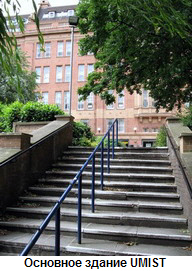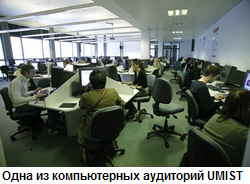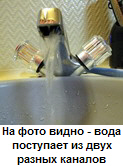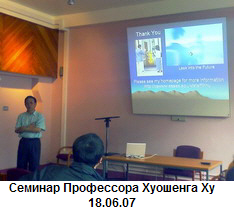UK education
 The Institute of Science and Technology of the University of Manchester (University of Manchester Institute of Science and Technology, UMIST ) is the largest technical institution of higher education in the UK, similar to the Russian MGTU. Bauman. Manchester, like all major cities in the UK, is filled with universities. UMIST - the most famous, it was here that on July 21, 1948, for the first time, a 52-minute program was launched on the Mark-1 computer, which made Mark-1 the first active computer with stored software 1 . Here, Alan Turing, in the position of deputy director of the computer lab, wrote in 1950, “Can a machine think?”, A work that initiated research in artificial intelligence and ends like this: “We can look ahead only for a very short distance, but now it’s obvious that we still have a lot to do in the area that was the subject of this article. ” Today we have the opportunity to “look ahead” - how are computers used at the University of Manchester 60 years after their first appearance in these walls?
The Institute of Science and Technology of the University of Manchester (University of Manchester Institute of Science and Technology, UMIST ) is the largest technical institution of higher education in the UK, similar to the Russian MGTU. Bauman. Manchester, like all major cities in the UK, is filled with universities. UMIST - the most famous, it was here that on July 21, 1948, for the first time, a 52-minute program was launched on the Mark-1 computer, which made Mark-1 the first active computer with stored software 1 . Here, Alan Turing, in the position of deputy director of the computer lab, wrote in 1950, “Can a machine think?”, A work that initiated research in artificial intelligence and ends like this: “We can look ahead only for a very short distance, but now it’s obvious that we still have a lot to do in the area that was the subject of this article. ” Today we have the opportunity to “look ahead” - how are computers used at the University of Manchester 60 years after their first appearance in these walls? Teachers lecture using laptops, media projectors and electronic notes, presentations or demonstrations of the programs, while rarely writing with chalk on blackboards. Students are handed out printouts of lecture notes with fields for marking. Some students print the text of lectures in classrooms on laptops. From any computer in the university network, a personal P-drive is available, a virtual hard disk where learning materials are stored. All installed software is necessarily licensed and proprietary. Homework sent to e-mail teachers. Computers are used everywhere, the built system works perfectly and no one needs to explain to anyone that education without the use of computers and web technologies today will be ineffective.
Teachers lecture using laptops, media projectors and electronic notes, presentations or demonstrations of the programs, while rarely writing with chalk on blackboards. Students are handed out printouts of lecture notes with fields for marking. Some students print the text of lectures in classrooms on laptops. From any computer in the university network, a personal P-drive is available, a virtual hard disk where learning materials are stored. All installed software is necessarily licensed and proprietary. Homework sent to e-mail teachers. Computers are used everywhere, the built system works perfectly and no one needs to explain to anyone that education without the use of computers and web technologies today will be ineffective.This saves the work time of teachers, especially if they are engaged in research and administrative work. The size of the effect in comparison with the individual teachers' sites and the traditional “talk and write with chalk” (“talk-and-chalk”) learning technology is not yet completely clear, but using VLE clearly reduces the teacher’s work time while simultaneously increasing the professional result.
For students accessing the Internet in search of information and resources on a particular subject, this ensures the concentration of the information sought within a single page.
The use of VLE provides for the collection of information on the degree of preparation of students and allows you to monitor the quality of education remotely.
Virtual learning tools contribute to the convergence of distance and university education or education in various educational institutions.
The system works very simply: from anywhere in the world you go to your home page in the system and get access to electronic journals, audio, video and flash materials (sometimes interactive and produced by the teachers themselves), schedule of subjects and exams, news, mail, useful career information. The web-interface is simple and convenient, students use the capabilities of the university portal very often, for example, to consult with teachers - it looks like communication on the forum: the student's question is the teacher's comments. With the help of web tools they solve very, very many questions, of course, a large role is played here by free unlimited 10-13 megabit Internet in university buildings, 3-5 megabit - in dorm rooms and cheap broadband internet in private houses and apartments.
 Doors of universities in the UK open day and night in the literal sense of the word. Students have identification cards, which even at night can pass and use, for example, a computer audience. Some particularly smart students watch movies on the big screen at night with friends, in lecture halls with media projectors. Indeed, if there is such an opportunity, why not use it :)?
Doors of universities in the UK open day and night in the literal sense of the word. Students have identification cards, which even at night can pass and use, for example, a computer audience. Some particularly smart students watch movies on the big screen at night with friends, in lecture halls with media projectors. Indeed, if there is such an opportunity, why not use it :)?English students love sports. In Manchester, you will not meet propaganda of bad habits anywhere, on the contrary, an anti-tobacco campaign recently made a stir, during which a kind of advertisement filled the streets and pauses in TV shows. The project quickly turned: to look at people with hooks in the lip very few people seemed nice. But it is very pleasant to look at the transparent walls of sports complexes, which settled in a large number in the city center: every evening all the running tracks, exercise bikes and other sports facilities are occupied by the Mankunians. A large number of sports fields in parks and stadiums are also full from morning (children) to evening (adults and students) - they play football, volleyball, and tennis.
 UK technologies are sometimes surprisingly conservative: for example, the general absence of mixers is due to the traditional British water supply system, in which hot and cold water is supplied with different pressures. Even if the mixer is found somewhere else, the channels for hot and cold water are separate in it, the water does not mix and you can get burned. In practice, this is the biggest disadvantage of dormitories (Hall of residence) and other residential spaces, but something is preventing the engineers of the United Kingdom from revising the age-old principles of water supply. One of my German friends put an end: "How can you learn high technology in a country where you have not learned to supply water through mixers?".
UK technologies are sometimes surprisingly conservative: for example, the general absence of mixers is due to the traditional British water supply system, in which hot and cold water is supplied with different pressures. Even if the mixer is found somewhere else, the channels for hot and cold water are separate in it, the water does not mix and you can get burned. In practice, this is the biggest disadvantage of dormitories (Hall of residence) and other residential spaces, but something is preventing the engineers of the United Kingdom from revising the age-old principles of water supply. One of my German friends put an end: "How can you learn high technology in a country where you have not learned to supply water through mixers?". Heads of departments in UMIST several times a month organize scientific seminars to which they invite their fellow scientists from universities around the world. Seminars are popular among students, scientists successfully operating, talk about the results achieved in their areas, show incendiary presentations 2 .
Heads of departments in UMIST several times a month organize scientific seminars to which they invite their fellow scientists from universities around the world. Seminars are popular among students, scientists successfully operating, talk about the results achieved in their areas, show incendiary presentations 2 .On June 18, 2007, a seminar “From Biological Systems to Human-Oriented Robotics” was held at UMIST by Professor Huosheng Hu of the University of Essex, Faculty of Computer Engineering (“From Biological to Human Centred Robotics”, Huosheng Hu , Department of Computer Science, University of Essex) .
The term “human-oriented robotics”, the professor and his group, denotes areas of robotics associated with the creation of various types of artificial intelligence systems and robots that will work in the community of people and are ready to help us everywhere: in homes, hospitals, offices. At the seminar, the professor spoke very vividly and fascinatingly about the work of his group in creating robots capable of helping people and possessing the properties of biological systems.
One of the interesting projects that Professor Huosheng Hu’s group is doing is a robot fish . Research and creation of the robot is sponsored by the London Aquarium. The ultimate goal of the project for the sponsor is to create artificial fish that mimic the behavior of living, not available for display in an aquarium, for example, deep-sea fish or dolphins. For these purposes, was allocated 500 thousand pounds. The group began with a study of the possibilities of moving fish in 2D space, then began to work with the third dimension, with depth. Now, in the summer of 2007, the group works with the ninth generation of robots, solving the problem of the interaction of fish with each other. The results achieved are already beneficial: “Our work potentially has a lot of applications, including the study of the seabed, the detection of leaks in oil pipelines, underwater search of mines, improvement of the performance of underwater vehicles and so on.”
The results of the Hu team's work are reported by many: Membrana in 2005, the Reyters about the 8th generation robotic fish:
Other research projects of Professor Huosheng Hu are also extremely interesting and of great practical benefit: “Hand-less control by an intelligent robot chair”, “Internet-based robots and tele-robots” (the full list of projects can be found on the professor’s personal website). The value of the work of the Huosheng Hu team precisely in the practical direction - only research that can bring tangible benefits, provide a new round of technologies, makes sense in applied sciences. Theoretical laws, methods are the basis of a practical engineering result and cannot be an end in themselves, which is often forgotten ...
Thank you for your attention, from the second part of the article you will learn how valuable it is to be a teacher, how to find a job for a graduate of a technical university, how to spend time in university pubs and what an energetic faculty at universities in the UK.
1 Chastikov A.V. Computer world architects. - SPb .: BHV-Petersburg, 2002.
2 Sometimes literally: during one of the presentations the fire alarm rang, the people in the building were taken outside, two fire crews arrived, walked around the building and left with peace of mind; the reason is supposed to be a concentrated burst of creative energy, which the alarm system simply could not stand :).
')
Source: https://habr.com/ru/post/11664/
All Articles